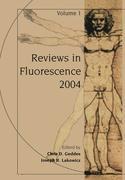Description
Reviews in Fluorescence 2004, Softcover reprint of the original 1st ed. 2004
Reviews in Fluorescence Series, Vol. 2004
Coordinators: Geddes Chris D., Lakowicz Joseph R.
Language: English
Subjects for Reviews in Fluorescence 2004:
Keywords
biochemistry; biology; biophysics; cancer; cell; metabolism; protein; spectroscopy; Biological Microscopy
Publication date: 08-2012
409 p. · 17.8x25.4 cm · Paperback
Publication date: 06-2004
410 p. · Hardback
Description
/li>Contents
/li>Biography
/li>Comment
/li>
Reviews in Fluorescence 2004, the first book of a new book series from Springer, is a collection of current trends and emerging hot topics in the field of Fluorescence.
This annual review series differs from Springer's current Topics in Fluorescence series in that it is more specialized and includes reviews of an individual's own work or scientific perspective. Reviews in Fluorescence will therefore complement the other fluorescence titles published by Springer, whilst feeding the requirement from the fluorescence community for annual informative updates and developments.
Key features:
- Reviews in Fluorescence will be citable, indexed, and available both in print and online.
- Reviews in Fluorescence will be published annually.
- Reviews in Fluorescence will comprise invited review articles that summarize the yearly progress in fluorescence.
- Alternate years will publish the Invited Papers from the Methods and Applications in Fluorescence conference series (MAFS).
Chris D. Geddes Ph.D., is an Associate Professor and Director of the Institute of Fluorescence, at the University of Maryland Biotechnology Institute, Medical Biotechnology Center in Baltimore, USA. He has a B.Sc. from Lancaster University in England and a Kodak funded Ph.D. in Physical Chemistry (fluorescence spectroscopy) from the University of Wales Swansea, UK. Dr Geddes is the Editor-in-Chief of the Journal of Fluorescence, and both the Editor and Founding editor of the Who's Who in Fluorescence and Annual Reviews in Fluorescence Volumes. He is also Executive Director of the Society of Fluorescence. Dr Geddes's research is based on the development and subsequent application of a wide variety of fluorescence based disciplines, such as multi-photon excitation, resonance energy transfer and more recently metal-enhanced fluorescence (also termed radiative decay engineering), to understanding biologically and industrially important systems and problems. The design, synthesis and characterization of new fluorophores and macromolecular protein-nanogold assemblies has recently led to the successful development of small molecule and sensing platforms for cyanide, TNT, glucose, fluoride and pH. Other research in Dr Geddes's Institute of Fluorescence involves developing non-invasive and continuous approaches for physiological glucose monitoring. Recently Dr Geddes has developed a range of highly-sensitive glucose sensing contact lenses that can monitor tear glucose levels ( 500 m), which track blood glucose levels which are 10-fold higher.
Dr. J.R. Lakowicz is Professor of Biochemistry at the University of Maryland School of Medicine and Director of the Center for Fluorescence Spectroscopy. Dr. Lakowicz has published over 400 scientific articles, has edited numerous books, holds 16 issued patents, and is the sole author of the widely used text, Principles of Fluorescence Spectroscopy, also pub
These books may interest you

Reviews in Fluorescence 2010 210.99 €

Reviews in Fluorescence 2009 210.99 €

Reviews in Fluorescence 2015 158.24 €

